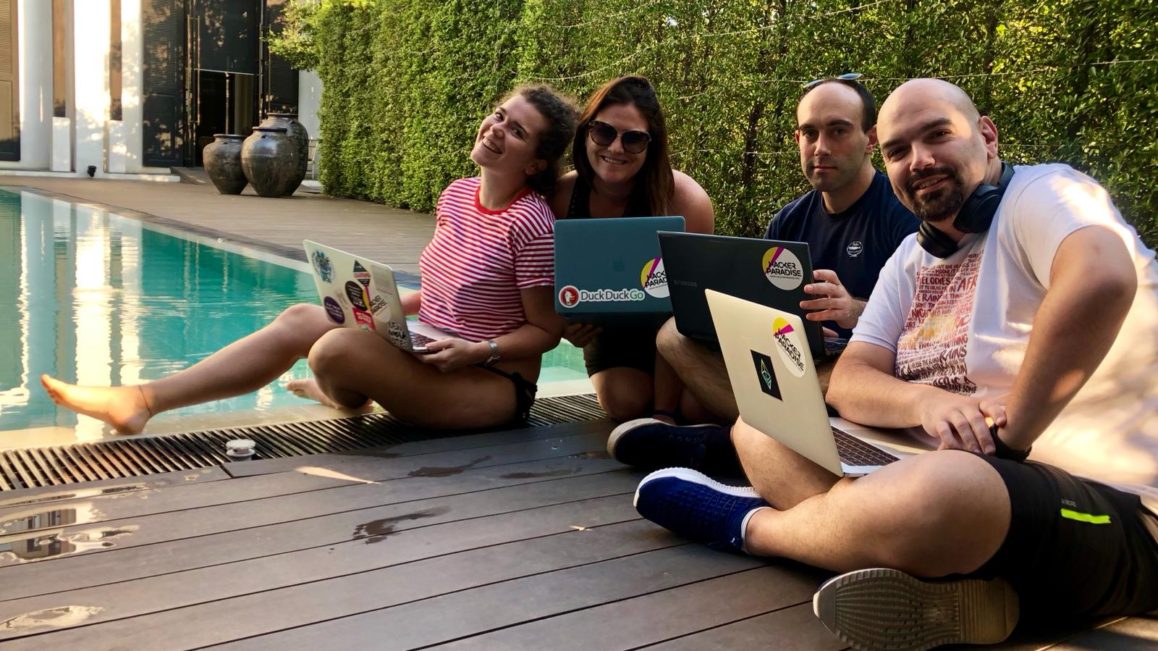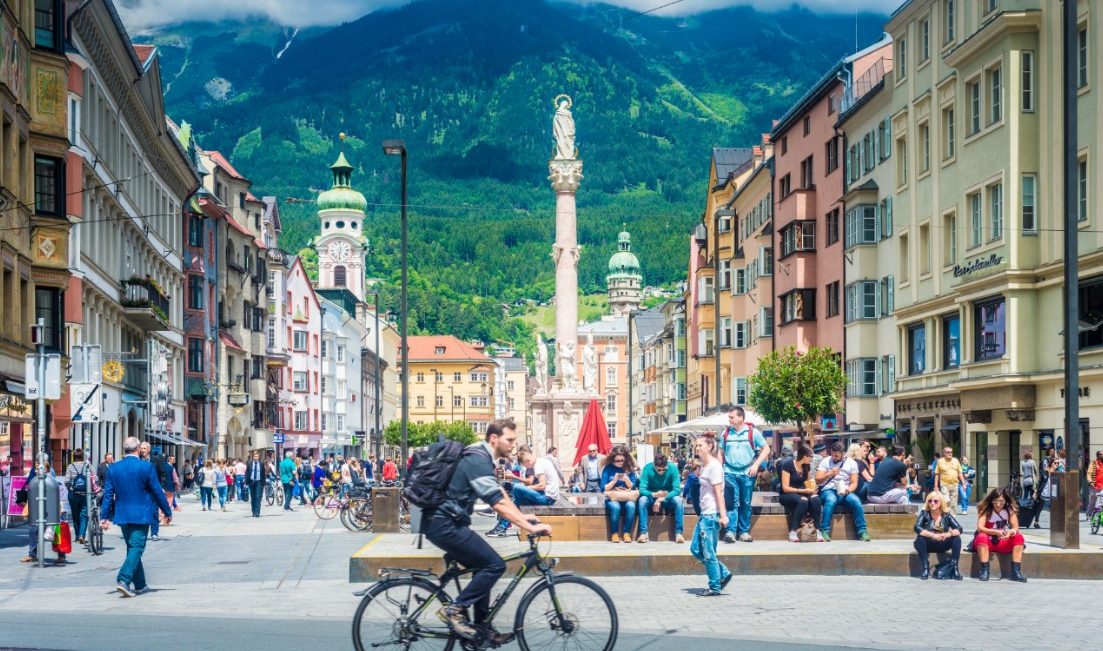11 BEST Places to Live in Indonesia (Updated 2023)
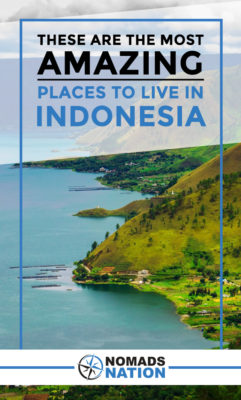

But how could you ever choose the best place to live in Indonesia – did you read how many islands there are?
We here at Nomads Nation have decided to do the hard work for you. We’ve narrowed down the best spots in Indonesia for you – so you don’t have to!
So whether you’re after your very own Balinese beach getaway, or whether you’re totally into the madness of big city living in Jakarta, we’ve got the lowdown on what’s going to suit you best in Indonesia.
Let’s see what’s on offer!
Staying Safe in Indonesia
Indonesia might have a bit of reputation for being sketchy, polluted, and prone to volcanic activity – as well as a little bit of Islamic extremism – but don’t let that you worry you.
The security situation in Indonesia, however, is nowhere NEAR what the world media likes to portray. Even then, those issues are only in small pockets of the far-flung islands of this country.
To feel safe – healthwise AND financially, we strongly recommend you sign up for worldwide travel health insurance. Genki offers two health insurance types, one travel health insurance, and one international health insurance.
Genki Explorer is your travel health insurance that covers you in Indonesia and in all countries in the world. Monthly subscriptions start as little as €39.30 and cover emergencies and medically necessary treatments while traveling.
Genki Resident is your holistic international health insurance that includes everything from emergencies, medically necessary treatments, preventive care, as well as alternative treatments, and much more.
Be sure to get a quote from Genki so you can stay safe when you are on the road!
Check out our ultimate guide to Digital Nomad Insurance!
#1 Canggu
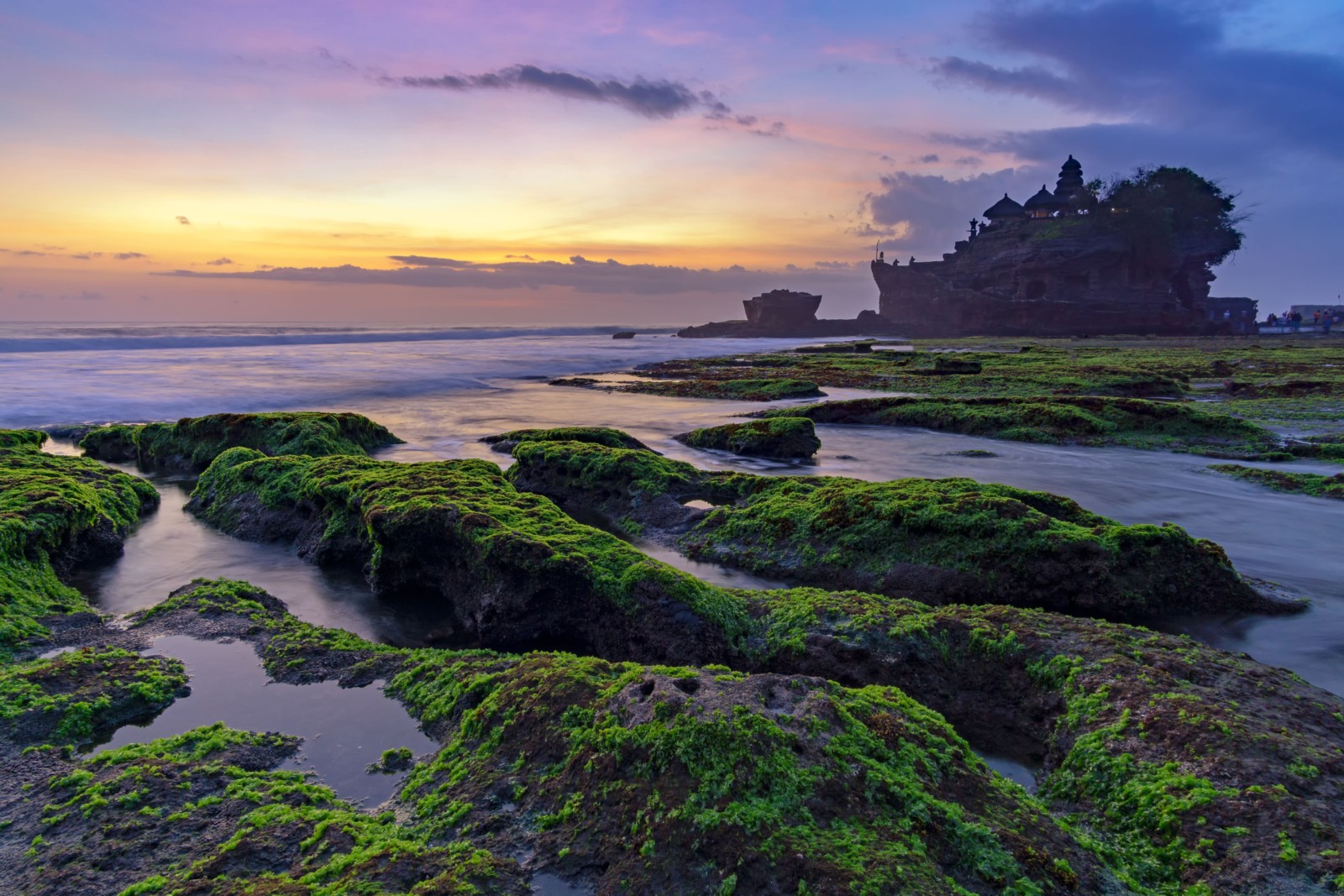

“Canggu is the Bali beach retreat that’s attracting everyone from casual backpackers to long-term nomads.“
Monthly cost of living in Canggu
$796/month*
cost of rent in Canggu
$358/month*
The sunny hotspot of Canggu boasts both beachside living and surfing, as well as a decidedly fun nightlife to be had, too. Set on Bali’s south coast, the town of Canggu is a cool mix of boutiques, bars, cafes and warung (traditional eateries).
There’s a lot on offer here – as well as a ton of accommodation to suit different budgets. Yes, Canggu itself is pretty small, but there are a few different neighbourhoods with different feels (and pricetags) to think about.
Batu Bolong is the centre, a good place to base yourself if you want to be in amongst it all. A quieter part is Pererenan, which is smaller, more laid-back, more local: think fewer tourists, more rice fields.
Pros of Canggu
-
A ton of wi-fi to enjoy in the cafes
-
Amazing amount of eateries to sample
-
Digital nomad community to socialise with
Cons of Canggu
-
Internet speeds aren't the best
-
Scooter is pretty imperative
-
Hipster lifestyle might put some people off
If you don’t feel like hitting the surf on Canggu’s beaches, or you’ve had one too many late nights partying, that’s something that can be remedied with a spot of yoga.
There’s plenty of places to practise yoga in Canggu; there are also a number of places you can get your pampering on, with massages and pedicures everywhere.
For those reasons, and more, there is a burgeoning digital nomad scene growing up in Canggu. In this steadily more and more hipster-ready town, you will find a growing, entrepreneurial community that’s bound to rub off on your own projects.
Digital Nomad Tip
With its fledgeling nomad scene, Canggu has a few cool co-working spaces. Hit up Dojo for good coffee and a beachside location; it’s got a pool and passable wi-fi speed. You can even live at Dojo.
#2 Ubud


“Affordable accommodation, rice paddies all around, serene nature: Ubud is all about chill living and yoga classes.“
Monthly cost of living in Ubud
$667/month*
cost of rent
in Ubud
$363/month*
Practically in the centre of Bali, Ubud lies up in the hills and makes good on promises of travel bloggers and vloggers across the world that it’s a chilled out spot: it is.
Days here start with roosters crowing, sun rises over emerald rice paddies, brunching in vegan cafes, and enjoying a good cup of locally sourced coffee.
Made up of several small villages, Ubud has a lot of great value lodgings – even central areas still have a countryside feel, complete with gardens.
Pengosekan is a cheaper area popular with backpackers, whilst Andong is all about creativity and the arts, with tons of crafty stuff to get up to in your free time.
Pros of Ubud
-
Live a healthy lifestyle on a budget
-
Ample chances to get out into nature
-
Very tasty food scene to enjoy
Cons of Ubud
-
Traffic can be pretty bad
-
A ton of tourists and tour groups
-
Gentrification
As per Eat, Pray, Love, Ubud is a centre for alternative therapies. Here you’ll find Balinese healers, meditation classes, sound baths, Reiki healing, massages – practically anything spiritual that can improve your well-being.
It’s all here. There’s also a ton of healthy food to back all of that up: raw, vegetarian, vegan, organic. Good quality and affordable.
And if you like heading out into nature that isn’t the beach, there’s trekking in them there hills and villages.
Digital Nomad Tip
A lot of coworking spaces in Ubud also have accommodation – Hubud is one of them. Complete with a cool atmosphere conducive to learning, Hubud has a community feeling and is run by creatives and techies.
#3 Jakarta
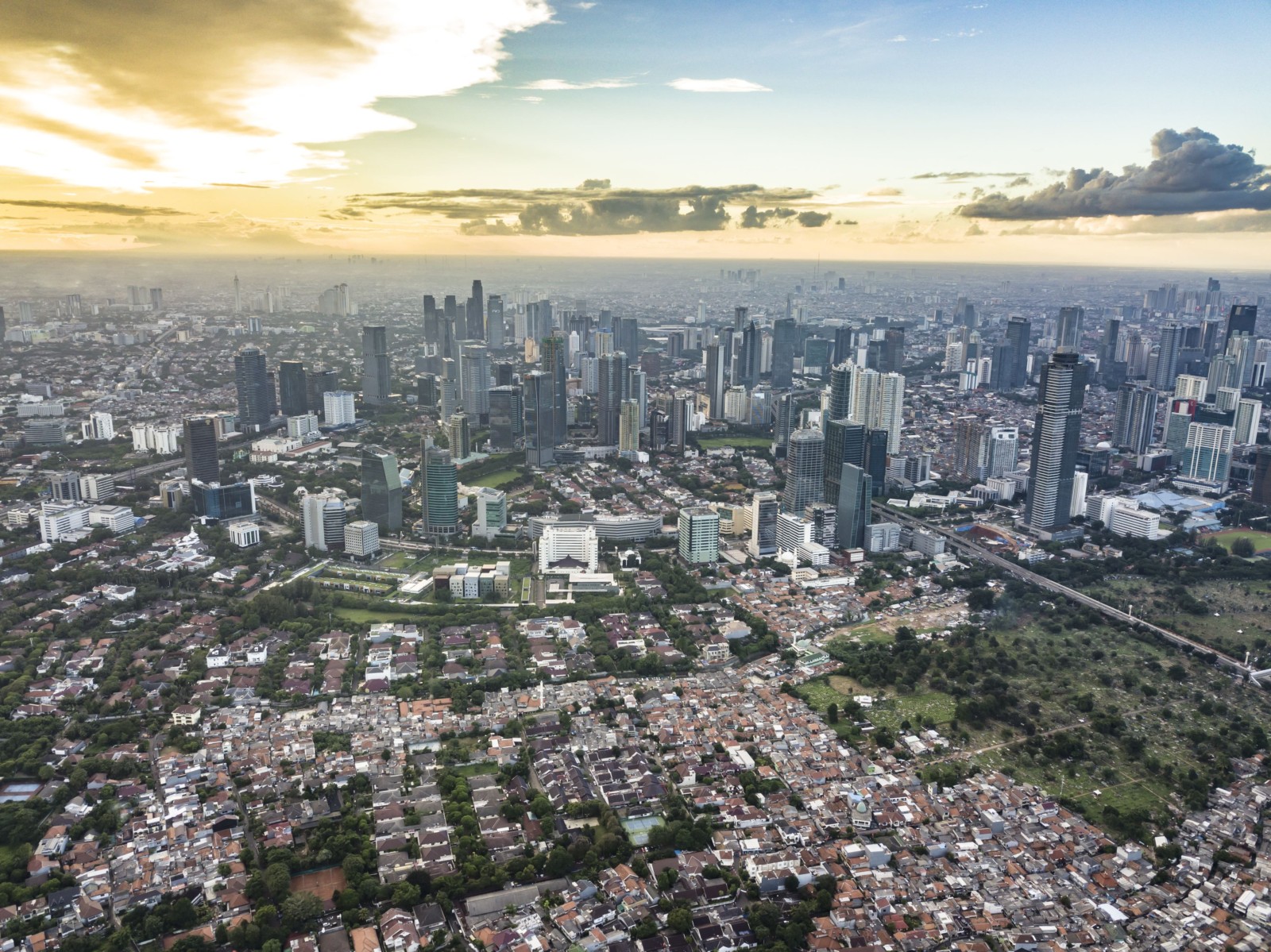

“Jakarta is where it’s at when it comes to city living in Indonesia, an urban sprawl of opportunities and creativity just perfect for an enterprising nomad.“
Monthly cost of living in Jakarta
$984/month*
cost of rent in Jakarta
$470/month*
Jakarta comes with all benefits, and downsides, to living in a huge city. The capital of Indonesia, it’s also the largest city and comes with big city issues like pollution and traffic.
Then again, living here you’ll have access to a world of skyscrapers, street food, malls, offices, and plenty of people to meet and mingle with along the way. Though huge, there are a few choice places that you should look at basing yourself.
Somewhere like the Golden Triangle is a good place to start your search; these new apartment developments are attracting young professionals who like to be in a (relatively) tranquil zone but still close to the city centre.
Pros of Jakarta
-
Literally so much to do
-
Great internet speeds everywhere
-
Very good transport links (inside and out)
Cons of Jakarta
-
Very bad pollution
-
Very bad traffic
-
Very busy city
It may be a big city, but public transport makes it pretty simple to get from A to B in this heaving city. That means you’ll be able to explore, to the fullest, what Jakarta has to offer.
Not only that but as a transit hub, getting out and around Indonesia – or catching a flight to elsewhere – is pretty easily done from here.
There are a lot of social activities going on Jakarta. From mindfulness events all the way music festivals and clubbing, you’ll never be at a loss of what to do with your days off. Get ready to never be bored again.
Digital Nomad Tip
As the capital, there are a ton of places to set up your laptop for the day. From cool cafes to coworking spaces, such as WorkOUT and EV Hive The Maja, both of which are nice places to work and get to know other people.
#4 Gili Air
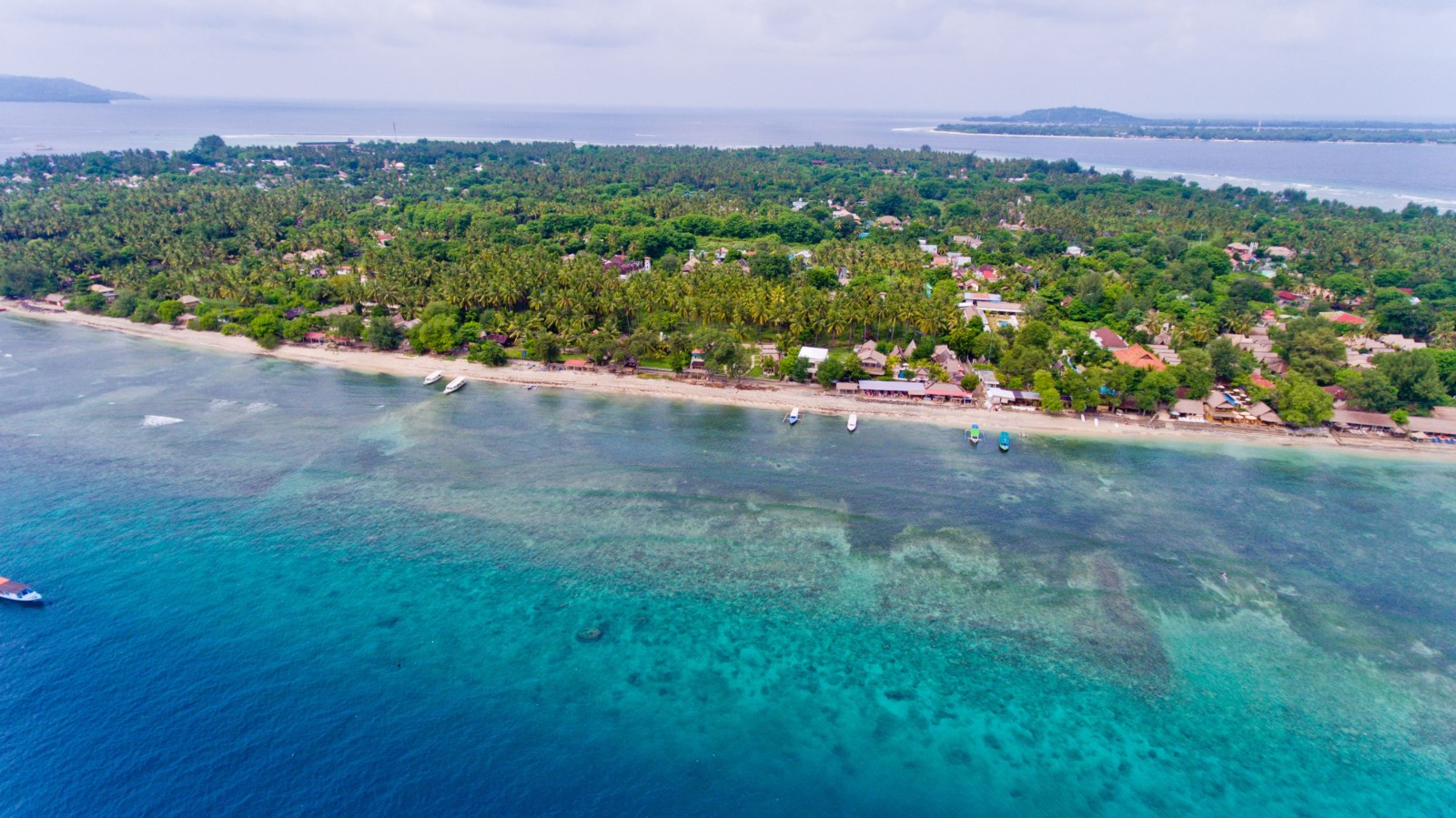

“No cars, no motorbikes: Gili Air is a small island paradise where you can truly chill and unwind amidst its palm trees and low-key vibe.“
Monthly cost of living in Gili Air
$797/month*
cost of rent
in Gili Air
$149/month*
Just off the northwest coast of Lombok – east of Bali – are the Gili Islands. The smallest of these is Gili Air. It’s a totally chill place to live as a digital nomad.
The island itself is just 5 kilometres round, so when we say small, we mean small. Practically all of the coast is sandy beach, and its warm, turquoise sea is perfect for watersports.
It’s small. That much we’ve established. Therefore you’re not going to have a whole world of choice when it comes to accommodation.
The best way to live on Gili Air is to find yourself a guesthouse, beach bungalow or hostel that’s fine with long-term stays. Research the best and most comfy place for you – and make sure the wi-fi is up to scratch!
Pros of Gili Air
-
Getting to live on a tiny, stunning island
-
Abundant marine life
-
Opportunity for daily watersports
Cons of Gili Air
-
Having to live on a tiny island
-
Internet isn't that good
-
You could end up getting cabin fever
As we mentioned, watersports are definitely something you can get up to in your off time on Gili Air. Not just things like SUP and kayaking, but also snorkelling and scuba diving to see the marvels of the deep.
When you’re done being active, watch the sunset over the ocean from the soft sand or from the comfort of a beachside bar.
You’ll be surprised at what you can eat and drink on Gili Air. Choose from a cocktail bar (for sunsets, obviously), a surprisingly good pizzeria, a Mexican eatery, and a chic beach club to name just a few establishments.
Digital Nomad Tip
The newly launched Cocohub is the (only) coworking space on Gili Air. Come for the wi-fi and stay for the sunset.
#5 Makassar
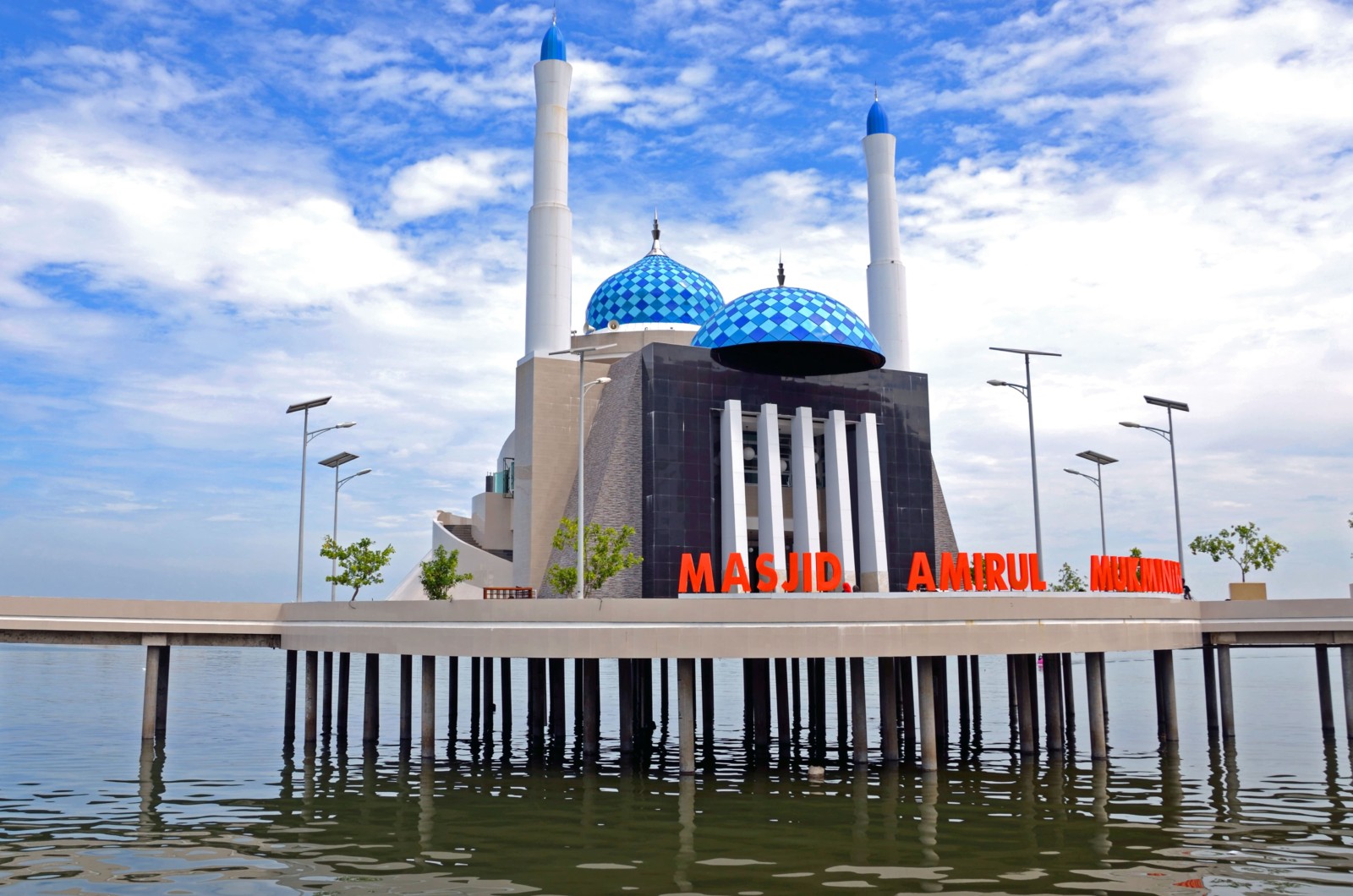

“One of Indonesia’s largest cities, Makassar is the big, bustling capital of South Sulawesi set in the centre of Indonesia for adventures further afield.“
Monthly cost of living in Makassar
$503/month*
cost of rent in Makassar
$214/month*
It may be lesser known as far as Indonesia’s cities and more famous towns go, but Makassar is an authentic urban experience – minus the tourist traps and tour guides.
If you’re looking for a place where you will be the only digital nomad (or even tourist) in town, then Makassar might well be the city for you.
Sound interesting? Then you’ll find a ton of affordable accommodation in the city’s Chinatown, just south of Fort Rotterdam.
For something a little bit more midrange, you might want to look closer to the Riverfront Promenade, close to Losari Beach, which may be a nice choice if you like waterside living.
Pros of Makassar
-
Well off the beaten track
-
Convenient city living
-
Good transport hub (including flights)
Cons of Makassar
-
You may get too much attention
-
You'll probably have to learn some bahasa
-
Lacks excitement of other cities
Makassar might be new to you, but it’s been a big player in the trading game for hundreds of years; the Buginese (or Bugis) ethnic group who make up about five million people of South Sulawesi even have their own script.
Sights? There’s the historic Fort Rotterdam, the well preserved former Dutch colonial part of town; and the Floating Mosque.
Don’t expect many people to speak English to you here. It’s just one of the many catches to living somewhere that’s so far off the tourist trail.
Digital Nomad Tip
There’s a surprising selection of coworking spaces in Makassar. Try out Miles Coworking Space: comfy, good AC, nice food and drink. There’s also Confie Coworking, complete with a cafe downstairs that plays decent music.
#6 Bandung
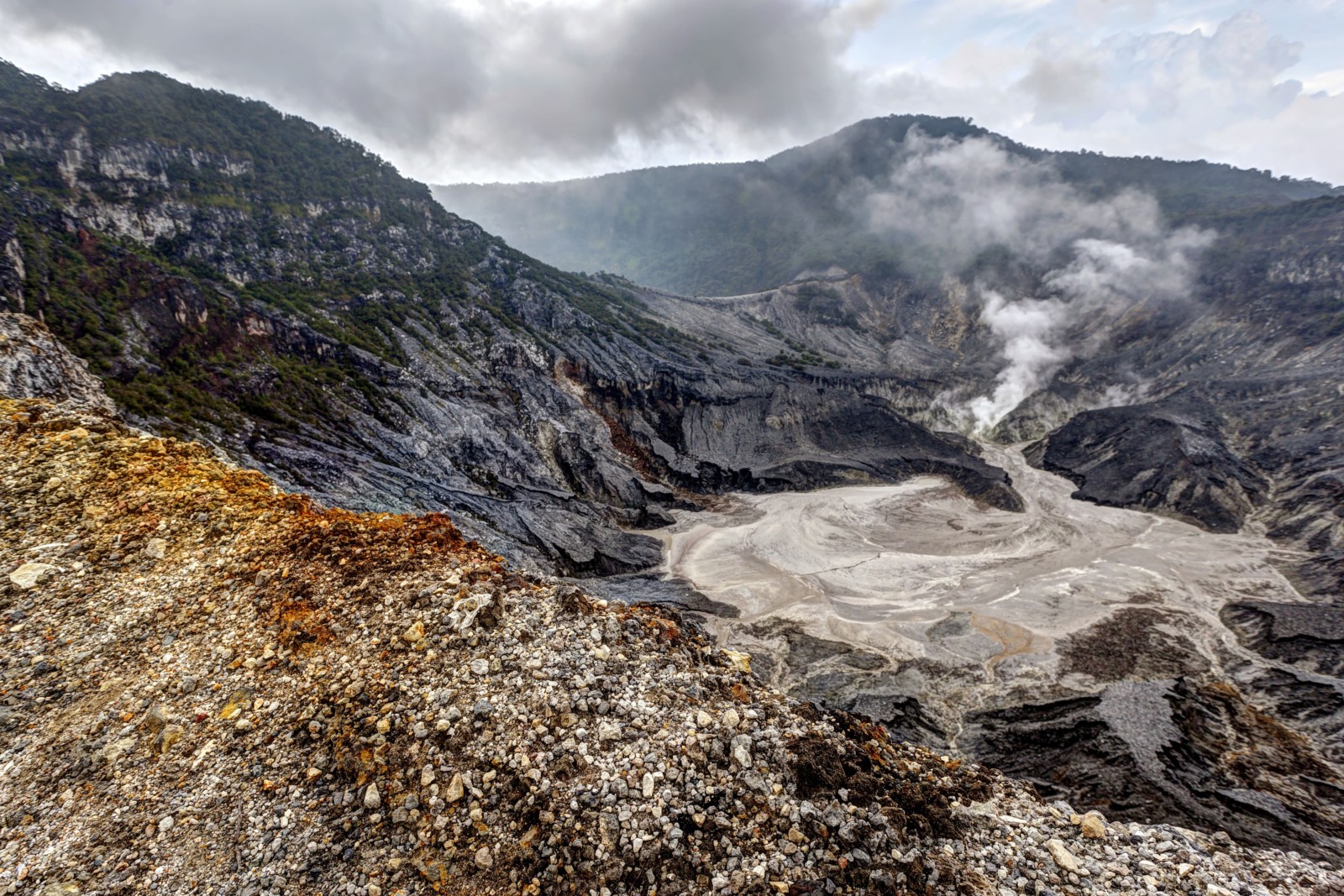

“Dubbed “the Paris of Java”, colonial boulevards and a laid-back lifestyle are paired with nearby volcanic peaks and coffee plantations for a little bit of earthly heaven.“
Monthly cost of living in Bandung
$646/month*
cost of rent in Bandung
$230/month*
The grandeur of Bandung may have faded over the past few years, but there still remains remnants of its heyday. Here, in the capital of West Java, you’ll get to discover for yourself its Art Deco buildings and cute cafes, where you can simply order a cup of joe and watch the world go by from a terrace table.
When it comes to choosing a place to live in Bandung, there are a couple of places that stand out.
One is Riau, complete with colonial buildings, heritage architecture and cool cafes. Another is the creative hub of Dago, where you’ll find boutique shops, culinary delights and, yes: more cafes.
Pros of Bandung
-
Pretty cool and creative city
-
Nearby natural surroundings to explore
-
Shopping galore
Cons of Bandung
-
Not as beautiful as it used to be
-
The traffic can be pretty bad
-
Can feel quite industrial at times
Bandung is also a top place for shopping. In fact, many Singaporeans make the 1 hour 40-minute flight from their city-state to the city to snap up some unique bargains.
There’s Jean Street, where you can pick up local denim designs from shops with madly illuminated facades, making for a truly quirky shopping experience.
Away from the metropolis itself, you’ll get to explore some of the rich countryside surrounding Bandung.
For example, the Kawah Putih (White Crater) is a stunning, water-filled crater that’s cool to see, whereas Tangkuban Perahu is an actual active volcano whose three, bubbling craters you can trek around.
Digital Nomad Tip
Want to get some work done in Bandung? Hit up CO&CO Space. This is a nice, quiet place to get your head down for a few hours. Alongside classes and workshops, there’s free-flowing water, tea and coffee.
#7 Cirebon
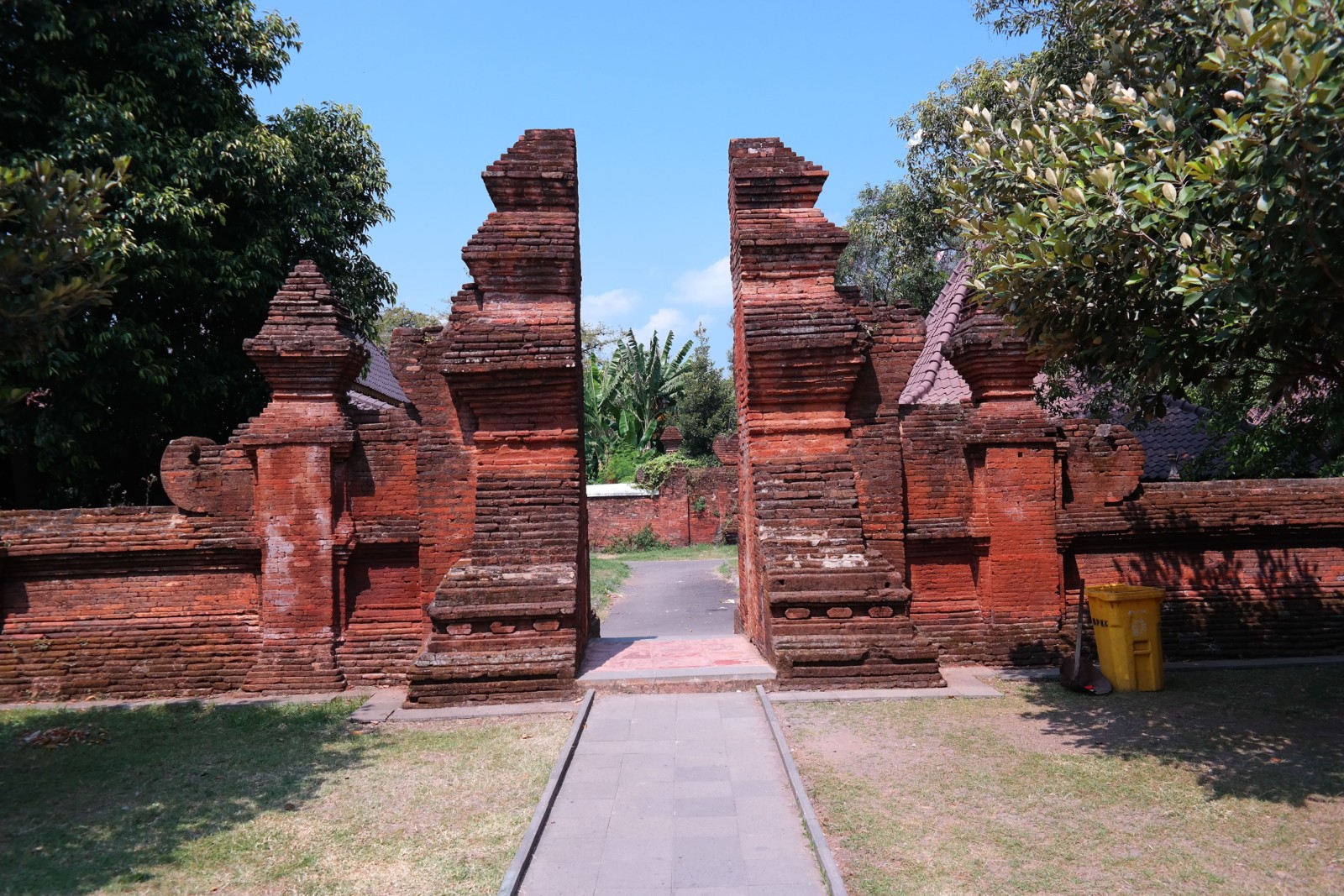

“The port city of Cirebon boasts history and culture by the sea for the discerning digital nomad to discover.“
Monthly cost of living in Cirebon
$489/month*
cost of rent in Cirebon
$213/month*
Cirebon has recently become a bit of a weekend getaway for West Javanese residents, largely due to its interesting history and culture.
Being the centre of the historical Islamic development of the area, there’s a lot of heritage (and architecture) to explore, with everyone from Arab to Chinese traders making their impact, too.
If you’re interested in staying in Cirebon, then you might want to consider staying in the area of Alun-alun Kejaksan.
Accommodation here is affordable, people like to jog around the park here, and the street food stalls are pretty good. Alternatively, staying near the Cirebon Central Station is good for getting out for day trips.
Pros of Cirebon
-
Interesting history to learn about
-
Seaside living (= seafood)
-
... And tons of good local food
Cons of Cirebon
-
A lot of travel by becak (annoying)
-
Maybe a bit industrial
-
Not exactly crawling with things to do
Impressive sights in the city of Cirebon include the Keraton Kasepuhan, a 14th-century building that shows the former might and open-mindedness of the area, with Chinese as well as Hindu echoes in the building style.
There’s also the Sunyaragi Cave, the 1703-built meditation hall that looks like centuries of wax candles melted.
Food, like in most Indonesian settlements, is also a big deal in Cirebon. To get your fill, simply head over to Kanoman Market, where you can find things like tahu gejerot (tofu in sweet and spicy sauce) or nasi jamblang (fried rice with various side dishes served on teak leaves). Batik is also famous in the area.
Digital Nomad Tip
There’s a coworking space in Cirebon called G. Work, which is pretty cool-looking, has decent wi-fi, and is a spacious spot so you don’t feel crammed in.
#8 Malang
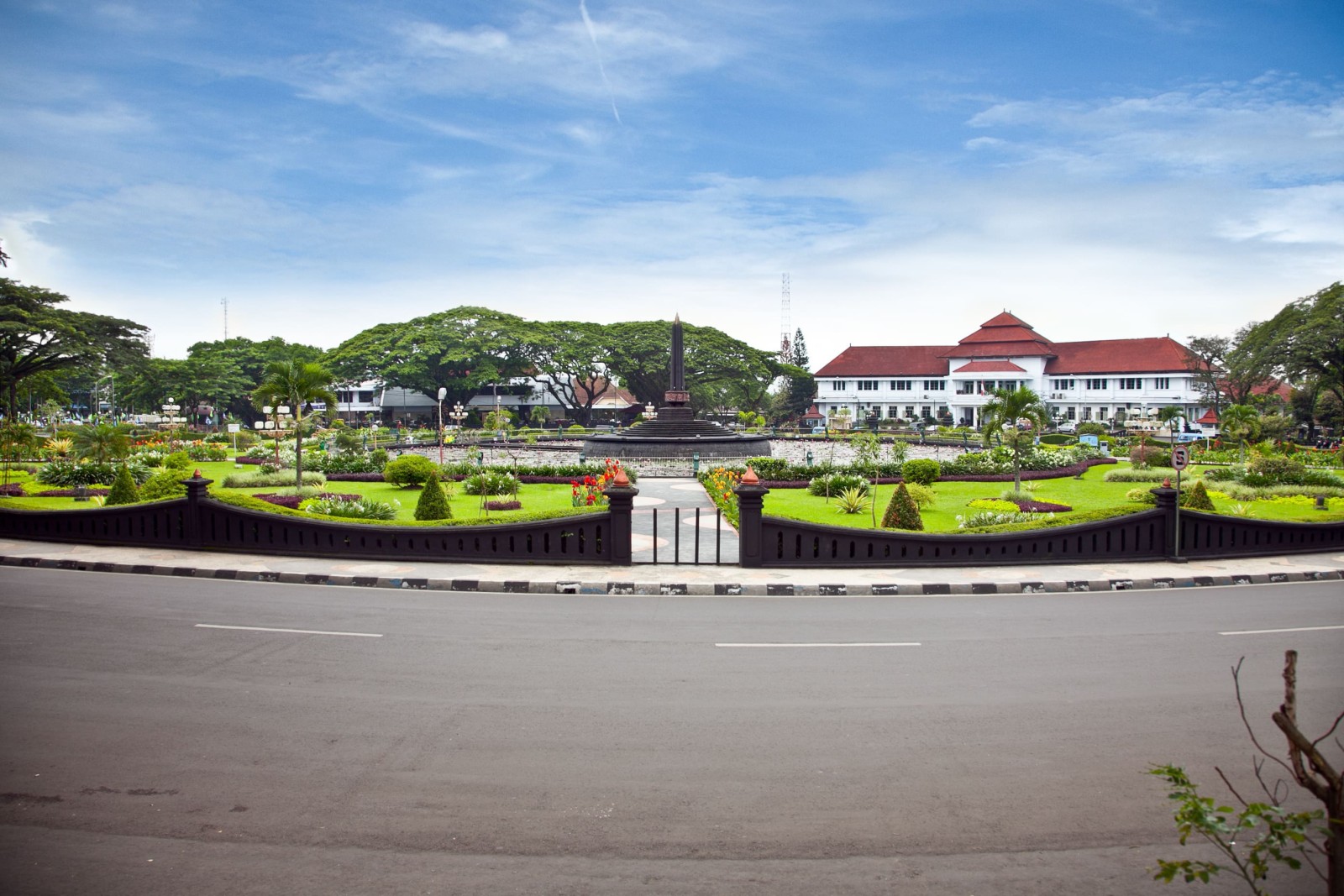

“The leafy, laid-back streets and easily unconvertable culture of university city Malang have made it an ever-popular pick for nomads.“
Monthly cost of living in Malang
$392/month*
cost of rent in Malang
$162/month*
Way more than just a transit hub on the way to Gunung Bromo, Malang has a whole lot going for it. Here you will find interesting architecture, outlying colourful villages, and even a Chinatown – every good Indonesian city has one!
Living here really means getting involved in local life, so get ready to rub shoulders with the people.
Looking for a place to live for a while in Malang? We don’t blame you. The tree-lined Oro-oro Dowo, in the northwest of the city, is littered with cool places to eat, trendy cafes and all the vibrancy you’d expect of a downtown area.
Elsewhere the city centre, with its colonial buildings, offers accommodation in renovated heritage buildings.
Pros of Malang
-
Cons of Malang
-
Lots of buildings for history buffs
-
Tasty food scene going on
Cons of Malang
-
Might not be a bit quiet for some
-
Some buildings are a bit run-down
-
Can be affected by volcanic activity
We challenge you to take a stroll along Alun-alun Tugu, complete with a stunner of a lotus garden, and walk around the Ljen Boulevard with its white-washed, red-roofed Dutch colonial houses, and not fall in love with Malang at its most picturesque.
As well as the rather impressive Grand Mosque in town, you’ll find evidence of the old Hindu settlement just west of Malang; there’s an ancient Hindu temple here dating back to the 8th Century AD, one of oldest in East Java. For more history, there are a selection of temples to the north and east of the centre, too.
Digital Nomad Tip
In Malang, you can get some work done The Bros Coffee & Coworking Space – an easygoing place to sit with your laptop or meet people for (tasty) lunch.
Need more info? Here’s a rundown of the best ways to explore Indonesia!
#9 Yogyakarta
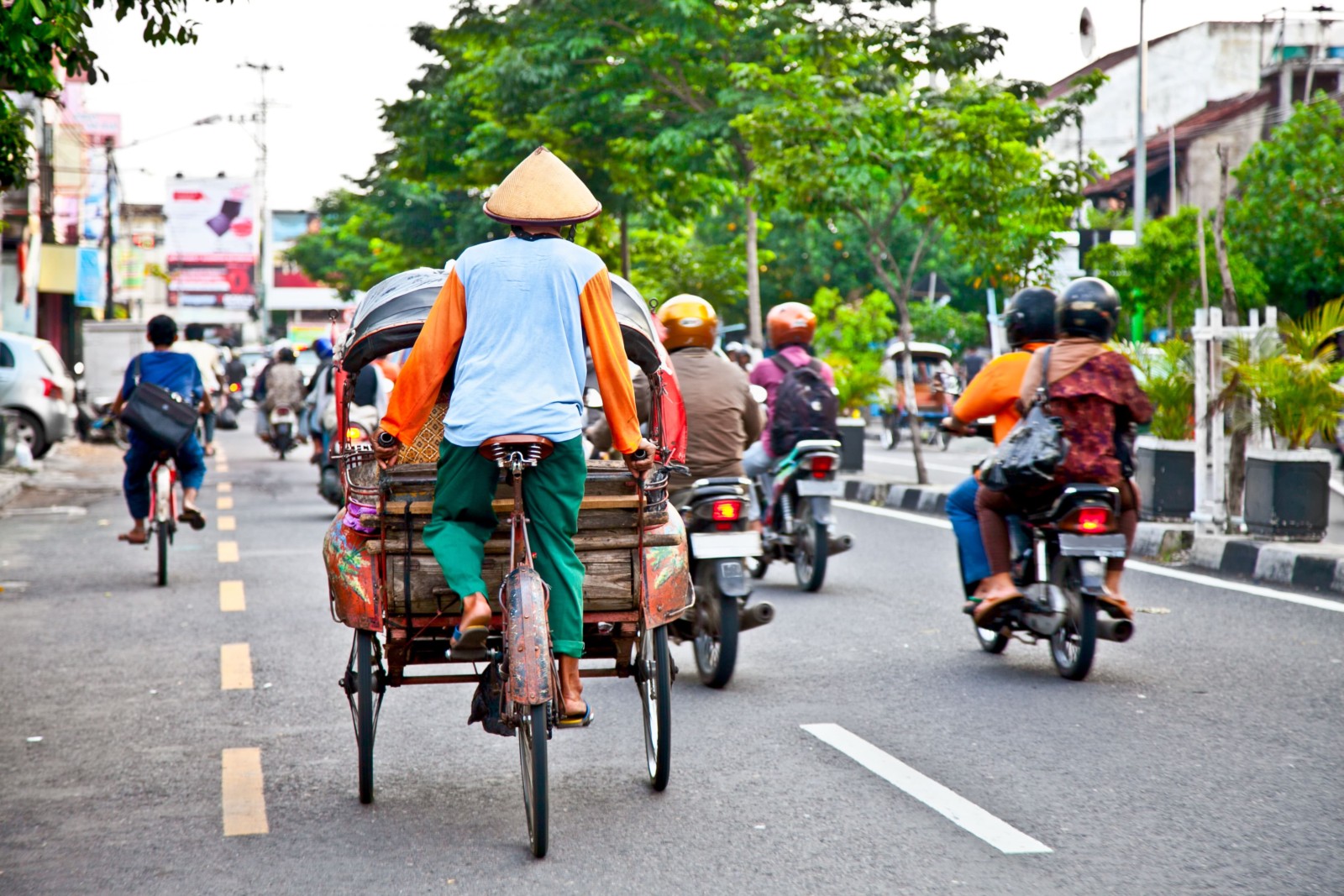

“The centre of Javanese culture, the royal city of Yogyakarta has all the colour and life that wide-eyed nomads will love.“
Monthly cost of living in Yogyakarta
$438/month*
cost of rent in Yogyakarta
$189/month*
Minus the traffic, and tourists, of other destinations in Indonesia, Yogyakarta is a cultural hub, considered to be the bastion of Javanese traditions, culture and fine art.
Located pretty much in the middle of the island of Java, Yogyakarta is also a great transport hub with easy connections to Bali and Singapore.
Living in Yogyakarta means basing yourself in affordable lodgings in the area of Sosrowijiyan.
Popular with travellers, the surrounding streets of this neighbourhood jostle with book stores, coffee shops, and traditional workshops for a friendly, fun place to wander on your days off.
Pros of Yogyakarta
-
Culture by the bucketful
-
A beautiful area of the country
-
Easy to find wi-fi around the city
Cons of Yogyakarta
-
Not the most lively city
-
Internet gets slow in the evening
-
Public transport isn't the best
The only place in Indonesia that’s still ruled by a monarchy, the city of Yogyakarta itself is centred around the walled old town. However, over the last couple of decades, the city has seen a lot of development (thanks to tourists) and has began spreading out.
Yogyakarta is a good place to come to get a better understanding of Indonesia. There is a laid-back atmosphere and a small, but active, digital nomad scene – much like Chiang Mai in Thailand, but not yet as overrun with temporary residents and tourist crowds.
Digital Nomad Tip
There’s loads of places to get online with your laptop in Yogyakarta. One of the better ones is Sinergi Coworking Space, which is super stylish, super spacious, and a ton of drinks and bites on offer. Nice ambience.
#10 Medan
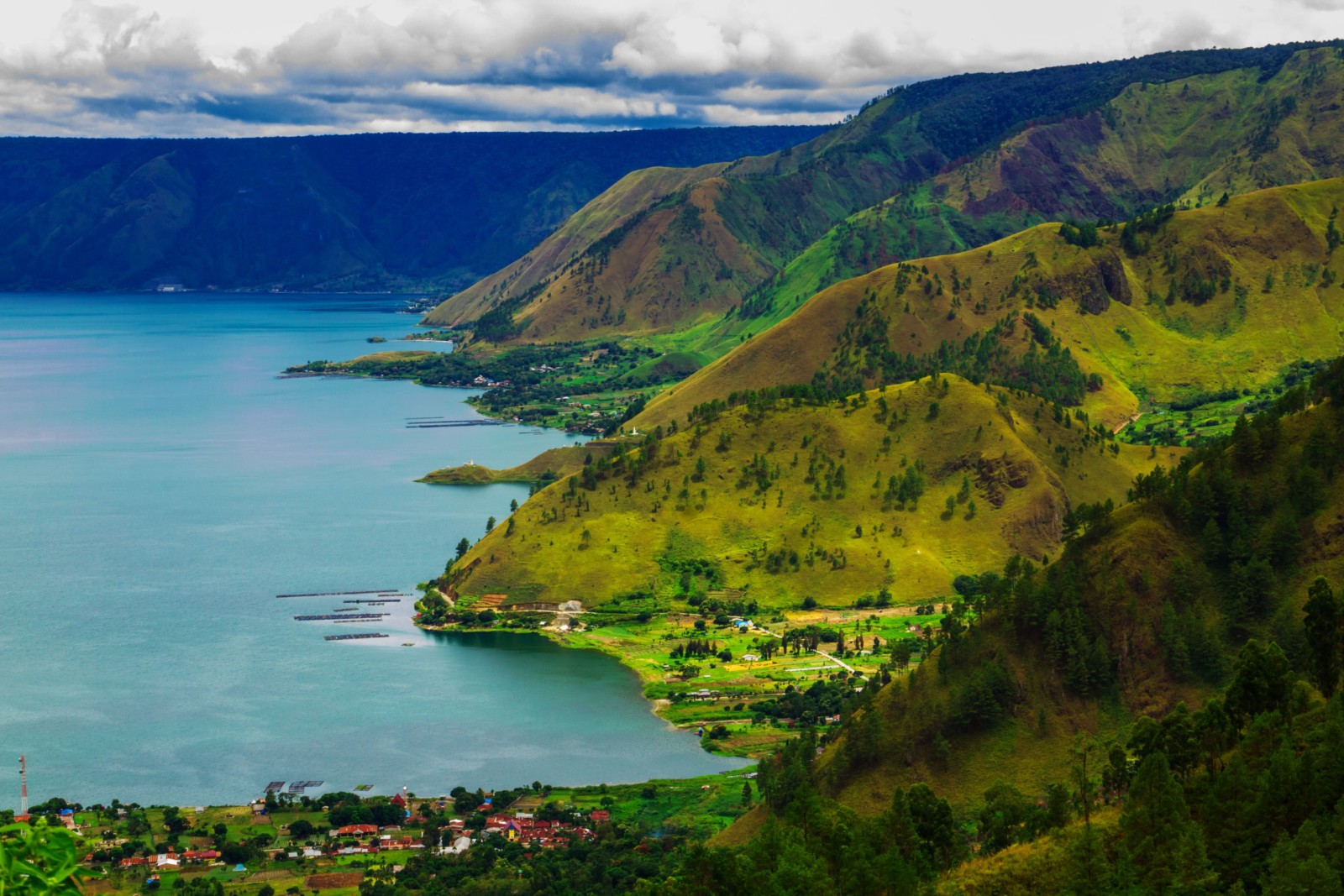

“Medan is the largest city in North Sumatra and, known for its culinary delights, is the place to go for foodies.“
Monthly cost of living in Medan
$496/month*
cost of rent
in Medan
$187/month*
Walking around Medan is pretty cool. Here you’ll find street after street of crumbling colonial buildings, many now housing chic boutiques or cool cafes and bars, flanked by street vendors selling succulent snacks, reminiscent of somewhere like Hanoi.
Likewise, it’s a busy city: crowded, noisy, but with all the excitement of a big city. One of the best areas for digital nomads to lay their hat in Medan would be Medan Polonia.
This is the central business district of the city with nice, neat (and affordable) housing close to all the facilities and amenities you could ask for. Not bad at all.
Pros of Medan
-
Incredible gastronomic scene
-
Great nature to explore nearby
-
Friendly people living here
Cons of Medan
-
More pricey than other cities
-
Very, very crowded place to be
-
Public transport is not nice to use
There are a lot of interesting things to do in Medan. One of these is simply sampling all the great food there is on offer; there’s a lot of influence from Chinese Indonesians.
Chinese flavours are everywhere here, from the roast pork to the mee pangsit (noodles with more pork). But there’s also Indian snacks like roti (deep-fried, stuffed flatbread).
Get out of the city and you’ll find some pretty astounding nature. Medan itself sits on the shores of Lake Toba, which is the largest volcanic lake in the actual world, thought to be formed by the eruption which shaped the climate of our actual planet about 70,000 years ago. No big deal.
Digital Nomad Tip
COHIVE @ Clapham is a coworking space in Medan with a decent community vibe where you can meet a bunch of different people. A cool, clean place run by friendly staff.
#11 Uluwatu
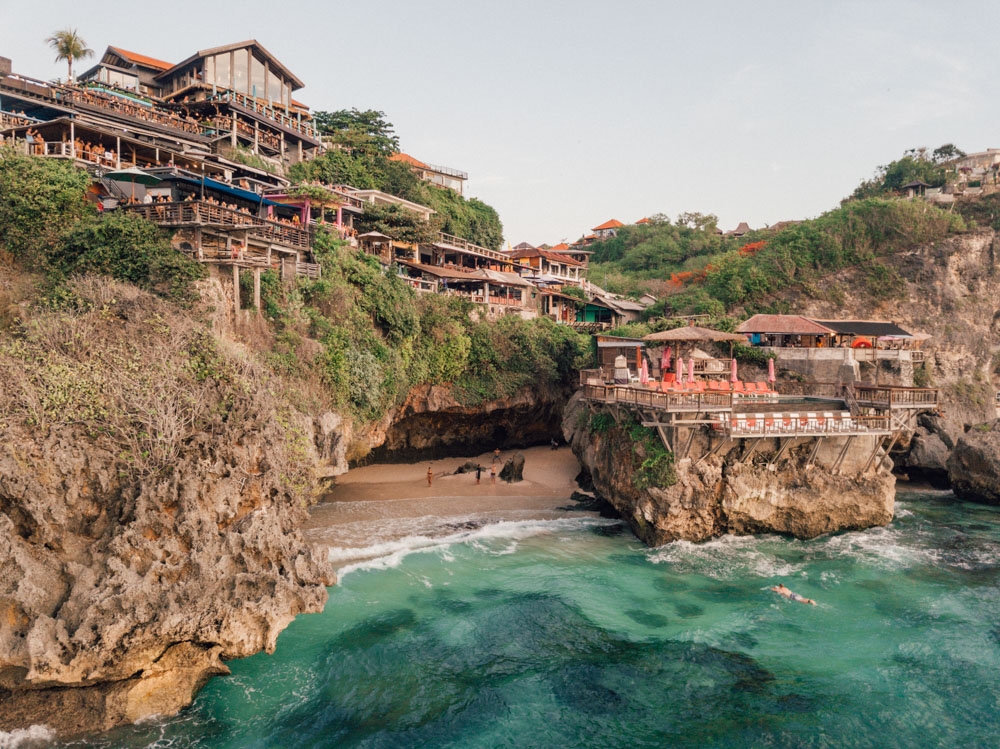

“Uluwatu has epic cliffs and sunset views, but those with a hankering for the waves head for this mini surfer’s paradise in Bali.“
Monthly cost of living in Uluwatu
$664/ month
cost of rent in Uluwatu
$291/month
The chilled out town of Uluwatu, on the west coast of Bali, is the perfect way to get away from the crowds that this island otherwise attracts.
There are beautiful beaches to lounge around on here, beach clubs to unwind in, clifftop views to soak up, the incredible Uluwatu Temple to visit – and, of course, surfing to enjoy.
Living in Uluwatu is simple. Rent a short-term (or long-term) apartment just a ten-minute walk from the beach. There are a lot of “for rent” signs around the area, so have a drive around and enquire.
Oh, yeah, having a scooter or motorbike around here is pretty much essential for getting around.
Pros of Uluwatu
-
Very relaxing place to live
-
Plenty of hidden gems (beaches, cliffs) nearby
-
Great for an active lifestyle
Cons of Uluwatu
-
Far from anywhere that's going on
-
Beaches here aren't for swimming
-
Not much to do if you don't surf
Featured in a “classic” 1971 surf film called Morning of the Earth, Uluwatu has been a firm favourite for surfers ever since.
Getting to the surf itself is all about getting down the cliffs (which is easily done nowadays with steps) meaning it has a pro feel; no surf lessons here, just pure breaks.
For food, you can head to one of the local warungs or sample one of cafes and restaurants in the area. There’s even the option to eat beachside at sunset.
Needless to say, it doesn’t get much more away-from-it-all than it does at the little outcrop of a settlement that is Uluwatu.
Digital Nomad Tip
Want to work? Head to Colabo Coworking, which is in Jimbaran. Superfast internet, wi-fi, and sea views – you won’t want to move. Otherwise, head to Suka Espresso in Uluwatu itself, complete with great wi-fi and tasty food.
Final Thoughts on the Best Places to live in all of Indonesia
So, people – those are the best places to live in Indonesia!
With more culture than you can shake a stick at and a mindblowing melting pot of food on offer, these cities and towns are going to hard to choose from.
But hey, you’re a Nomad, right? If you can’t choose between a few of your favourites, why not travel between them for an Indonesian adventure?
Keep on keeping on, guys!
Looking for more great Digital Nomad content?
- Love backpacks? Check out our Complete Tortuga Setout Review
- The Best Digital Nomad Gear on the planet
- These Best Places to Live in Bulgaria will blow your mind!
- Wondering ‘What is Remote Year?’
***Disclaimer*** Some of the links in this post are affiliate links. This means that if you use our links, Nomads Nation will earn a small commission at no extra cost to you. Thanks for the love and support!

